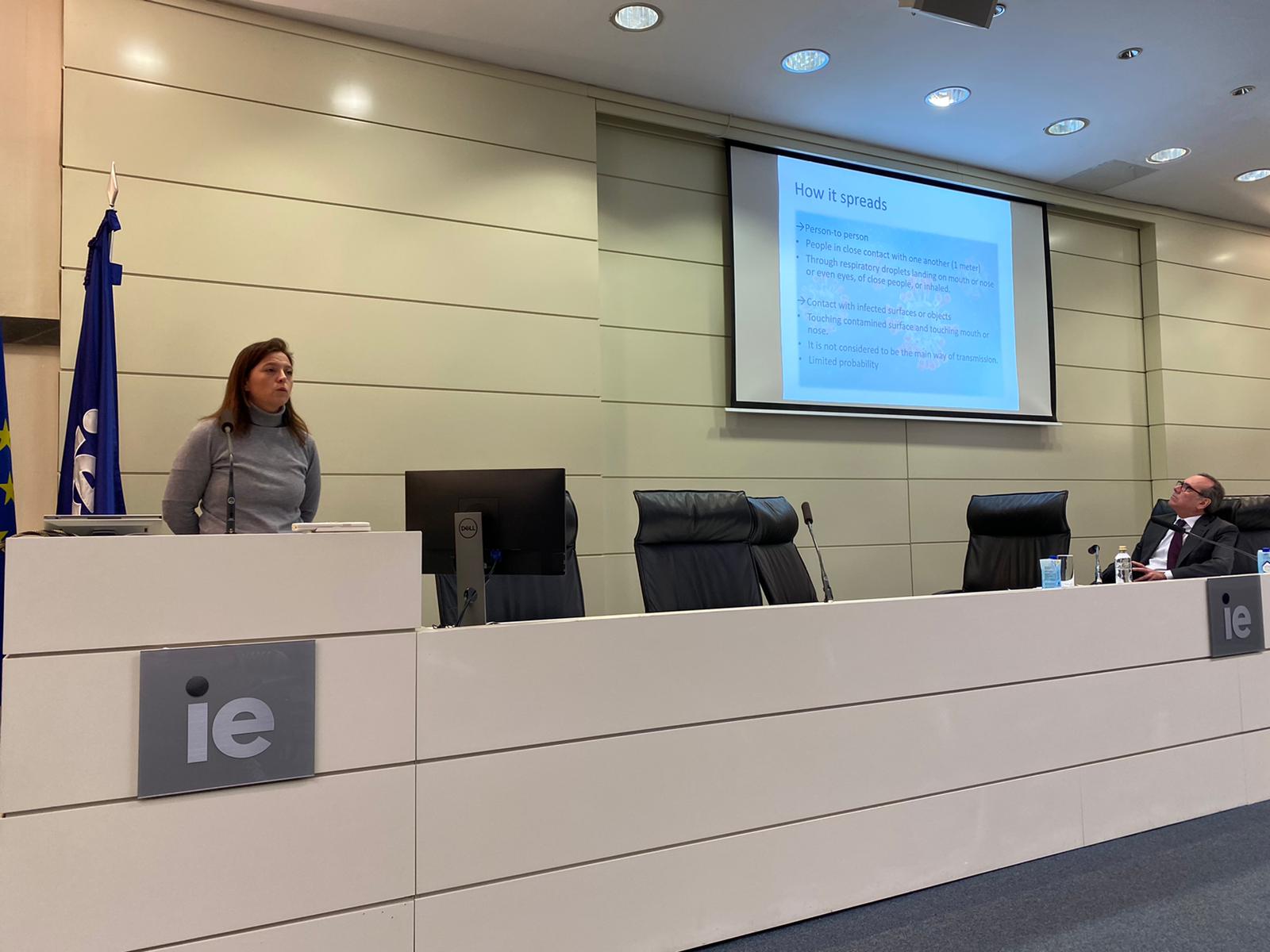On the morning of Friday, March 6th, IE University’s COVID-19 spokesperson, Gonzalo Garland, the Vice President for Development at IE Business School, held a private press-conference with media representatives from notable Spanish newspapers to address the public’s inquiries to the university’s response to the coronavirus outbreak. The session informed the representatives with the most recent information, the specific processes IE is using to monitor and quickly react to potential infections, as well as its faculties’ forecasts on the virus’s disruption of the global economy, represented by Professor Gayle Allard from the School of Global Affairs.
IE began by establishing its three pillars in addressing the outbreak.
1) To guarantee the continuity of academic activities.
Exams are coming up, so what does that entail? IE has been working with a Madrid start-up program to monitor students and their behavior during the exams. Some exams, however, have been canceled, but a few teachers have been given some margin of discretion to reallocate exam events. Other exams will be carried out in an oral or written form, and then submitted online.
As of the current status of the COVID-19 outbreak, the Madrid (1 infected) and Segovia (2 infected) campuses are under different circumstances, thus, different measures have been taken to address the situations. In Segovia, classes have gone fully online with the campus closed. Meanwhile in Madrid, a mix of face-to-face and online courses have been provided so that the students, who wish to either continue with physical attendance or stay at home, are able to attend class, with all lessons live-streamed through Adobe Connect.
2) To guarantee transparency and communication
IE has been keeping in touch with the Spanish Health Authorities and they are in constant contact with the students that i) have been diagnosed with COVID-19, ii) have been in close contact with the infected. Additionally, IE launched a website on Friday, Feb.29th, coronavirus.ie.edu, to give live information about this evolving situation. There has been a Q&A section added to answer inquiries from both the international and local communities as well as to address different concerns.
3) To prioritize the health and wellbeing of everyone: students, staff, workers, and even their families.
As for the wellbeing of everyone, IE is working relentlessly to meet and even go beyond the health standards that have been suggested by the WHO and the Spanish Health Authorities. The first and prime example has been the transition to the online classes. Even before the outbreak, the university had prepared a contingency plan of action, ensuring a quicker execution due to the cases in Segovia. There were already plenty of blended face-to-face and online courses, and over 70% of the teachers were able to swiftly transition into online classes. Additionally, IE and UNESCO will have an online meeting on the 10th of March, which will give further information on additional steps taken towards guaranteeing IE Community’s members.
Masterclass by: How does Corona Virus affect the Economy?
Professor Gayle Allard, a teacher of the School of Global and Public Affairs, gave a brief masterclass about the impact that Covid-19 has had on the world. She opened the session with the fall of many stock markets along with a steep fall of the PMI (Purchasing Managers’ Index) correlated with a forecasted fall on GDP.
Some of the quick real-life examples developing in the world economy are notable. For example, Apple announced that there would be a fall in the production of iPhones not only because of stoppage of the factories but also in the effect that the disease had on the rest of global supply chains as well as transportation.
“China is the workshop of the world”, said Professor Allard, “It will be difficult to meet global production demands if it will remain under quarantine.” With consistent interaction with the participants at IE’s WOW Room, she also noted that the part of the effect of the disease is the public perception, with the main concern about how bad people think it is rather than how bad it actually is.
Professor Allard noted that some of the industries that will be affected the most, will be:
- Airlines
- Tourism
- Pharmaceutical Companies
- Production companies
- Distribution Companies
To get a sense of what the future could look like, she asked the participants whether they thought that this pandemic would throw the global economy into a recession. The results were favorable, with 56.3% voting NO and 43.8 voting YES. She closed off the WOW Room session with a question for the audience to reflect on: “What is the future of globalism as we know it?”
[Updated Live. Last edit March 6th 10.33]
Connect to the live conference here: https://coronavirus.ie.edu/







